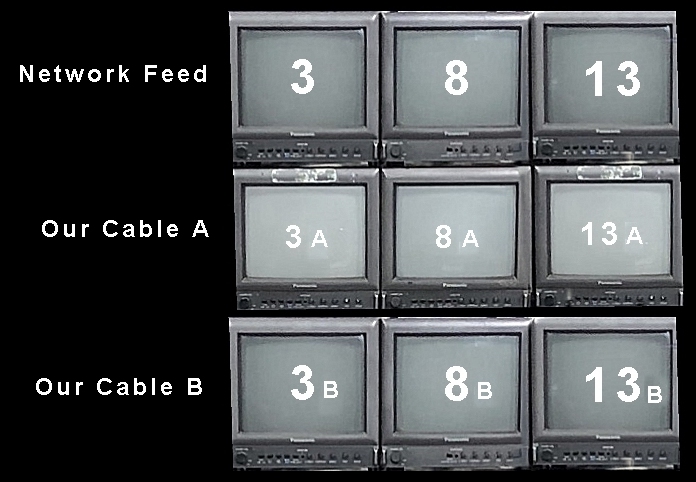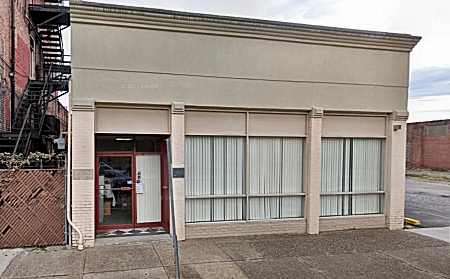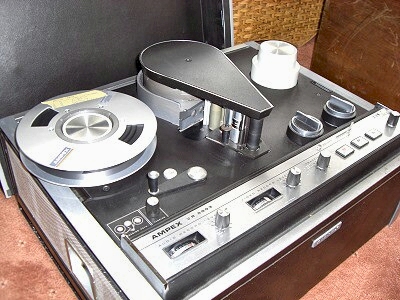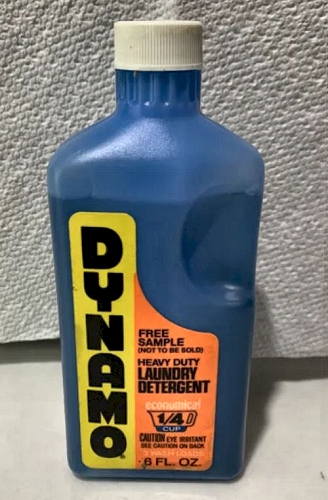CHARLESTON WAS THE NATION'S TESTING GROUND FOR NEW PRODUCTS:
I worked for
Capitol Cablevision in the early 70s. I was what they called a
"Studio Technician". My job was to run the old movies, make
sure the weather cam was working, but more importantly, assist in
running commercials that no one in the world ever saw, except here in
Charleston WV.
|

In those
days, Capitol Cable only supplied three channels: 3-8-13,
which was WSAZ, WCHS, and WOWK. This sounds strange today, but if
you lived where you couldn't get these channels on your antenna, you
were happy to pay. We also ran the occasional "B" rated black
& white movie. When they weren't playing, we had a camera
that swept back and forth across some weather dials.
That's it.
That's all you got for your money in the 60s and 70s, but many people
had no other choice if they wanted to watch TV.
|

The old Capitol Cablevision office on Broad Street
Capitol
Cablevision had hooked up with a company out of NY called "Primary
Communications". That company was in charge of testing new
products for all the major corporations in America. Here's how it
worked:
We only had 3 major television feeds in Charleston: Channel 8, 3, and
13. During commercial breaks, we could stop the commercials
coming out of New York and insert our own. These new commercials
belonged to the corporations, and so they paid us to block their own
commercials from NY and insert their new commercial. These new
commercials were always new products that that the corporations were
testing. Instead of filling grocery shelves all over America and hoping
the new product would sell, (and possibly losing millions of dollars if
they didn't) they brought thousands of these new products to Charleston
and stored them in warehouses around town. The biggest ones were on
Bullitt Street. These new products were distributed to all the
stores in the Capital Cablevision viewing area. Then, all day
long we would block that corporations commercial out of NY and insert
the new product commercial.
We had a log of every commercial about to play, and so we watched our
monitors carefully. When the NY commercial was about to play, and the
TV screen went black for a split second, we would push a button and
block that commercial. Then we inserted the new commercial. We had state of the art 2 inch Ampex video recorders.
These were very expensive, and you had to run them up to speed in order
to play the commercial properly. Remember, this was 1972 and it
would be close to a decade before home units were available.

At that point, we checked to make sure that the commercial we blocked
was the corporations commercial, and not someone else's. Then we
fired the VCR and played their commercial. For people who saw
this back then, they noticed that sometimes the commercials would be
cut off abruptly and the TV show they were watching would start
late. This was because WE were late in starting our commercial on
time. This was usually because we weren't sure that the commercial we
were about to cover up was really ours, and the last thing we wanted to
do was cover up someone else's commercial that they spent a lot of
money on.
|
Another
interesting thing is that Capitol Cablevision actually had 2
lines. That meant that we could run our commercial on "Cable
A", "Cable B" or both. And THAT meant that you might see
the commercial out of NY if you were on an antenna, while your next
door neighbor saw a different one, and HIS neighbor saw a different
one. As women were the main shoppers, most of the products were
geared towards them. For instance: We had a product called
"Dynamo Liquid Laundry Detergent".

See the story of this product at the bottom of the page
Another one was "Betty Crocker Snacking Cake". The company would
load all the store shelves with these products, and if they didn't sell
here in Charleston, they were never seen again. If they DID sell, then
they were distributed all over America.
|
Charleston was
picked as a testing center for a couple of reasons, demographics being
the main one. We had rich and poor, young and old. The other was
that we had a decent Cable system in place. So Charleston
was picked over many other cities.
I always felt that since the customers of Capitol Cable were guinea
pigs for new products, they should get a discount on their bill, and
there were some that actually did by filling out a form of what they
purchased that week. Anyway, that's the best kept secret in
Charleston for years, and few today even know it happened.
|
|
So What Happened?
I really don't know, as I left the company about 2
years later. Actually I was fired. Why? I was working 7
days a week for two solid years without a day off. On the
weekdays, I was working for Capitol Cablevision, while on the weekends,
I worked for Primary Communications. ( They were the ones doing the
commercials remember? ) Thing is, I was putting in 56 hours
a week with no overtime, because each company paid me separately.
What's wrong with that you say? Here's what: I was doing
the exact same job for both companies. What I did 5 days a week
was exactly the same as I did on the weekends, but they split the days
so they wouldn't have to pay me overtime. After 2 years of this I
happened to mention to someone in the building that I didn't think that
was fair. So that "someone" mentioned it to the boss and I was
immediately fired. The WV wage & hour division was just
around the corner from our building, so I walked straight over there
and told them what was going on. To make a long story
shorter, I was given thousands of dollars back pay and the boss
himself was let go.
In the meantime, I know that Primary Communications vacated their
building ( which was across Broad Street from us ) some time later. I
don't remember when. None of us know today what's
going on behind the scenes. Are they still testing us? With
today's technology, they could and we'd never know it.
|
Now about that Dynamo....

The
warehouse over on Bullitt Street was full of
Dynamo Liquid Laundry Detergent. One day a worker walked in only
to find an inch of the detergent covering the floor. It seems
that the caps on the bottles were faulty, and hundreds of gallons had
leaked. Now how this happened I don't know, because if the
bottles were
stacked upright, that shouldn't have happened. Whatever the
reason, they had to destroy thousands of gallons of the stuff before it
hit the market shelves. Our company told us that we employees
could have all we could carry out of the warehouse, but that just made
a dent in the amount. So they hired a local well known refuse
company to haul it all away to the landfill. This they did.... but not
all of it. About a quarter of the stuff they saved to wash their
garbage trucks, which they did for over a year. But "someone" saw that
they were still using the stuff and turned them in to the company who
made it. That brought about a lawsuit, of which I cant remember
the outcome. I do know that the privately owned garbage company
wasn't around later. How much later I don't remember, and I also know
if their demise had anything to do with the lawsuit or not.
|

Back To Seventies Index
|

